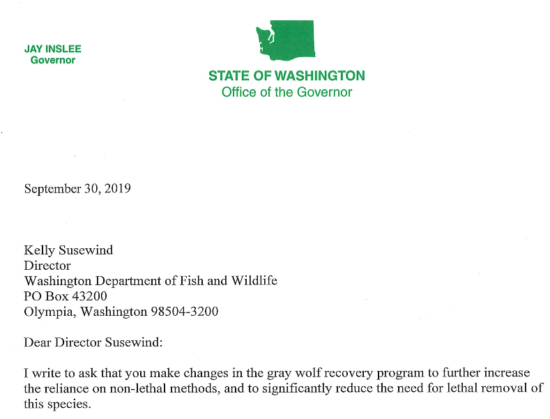
Washington Governor Asks WDFW For Changes In Wolf Management
Updated 6:30 a.m., Oct. 1, 2019.
For the second time in recent years, Washington Governor Jay Inslee is stepping in state wildlife managers’ wheelhouse on predator management, in 2015 with cougars and this fall over wolves.
He sent WDFW Director Kelly Susewind a letter today that in part asks the agency to “make changes in the gray wolf recovery program to further increase the reliance on non-lethal methods, and to significantly reduce the need for lethal removal of this species.”

Referring to issues in Ferry and Stevens Counties, Inslee claims that the state wolf plan “does not appear to be working as intended” there and that he believes WDFW “cannot continue using the same management approach on this particular landscape.”
Northeast Washington is not only where the most wolves in the state are and where recovery goals were met long ago but also the sight of the most conflicts with livestock, mostly cattle but some sheep, on federal allotments and private lands.
Even as most Washington wolf packs generally stay out of trouble, there have been chronic depredations in the Kettle Range three of the past four years with the Profanity Peak, Old Profanity Territory, Togo and Sherman Packs coming under WDFW’s gun as livestock pile up and nonlethal tactics fail.
The agency uses a hard-won protocol to detrmine when to remove wolves, with requirements that producers use a set number of conflict prevention measures and that there have been either three confirmed/probable wolf attacks in a month or four confirmed in a year. It was agreed to by WDFW and members of its Wolf Advisory Group, made up of ranchers, hunters, advocates and others from Washington. Ever since it has been in place, out-of-state groups have been trying to blow it up.
Triggered by issues there again this year, wolf advocates, mostly from out of state and now including Wayne Pacelle, formerly of HSUS, have been mounting yet another pressure campaign on the governor.

It also involved a court battle this summer that saw WDFW lethally remove what were believed to be the last four OPT wolves just before a judge ordered them to cease the operation.
“We must find new methods to better support co-existence between Washington’s livestock industry and gray wolves in our state. The status quo of annual lethal removal is simply unacceptable,” writes Inslee.
Rep. Joel Kretz (R-Wauconda) is right in the thick of things in Northeast Washington and read the letter for the first time this evening.
He reiterated that he supports non-lethal work that is site-specific as well as more innovative local range riding programs, but also said that problem wolves need to be dealt with quickly, effectively and completely to head off more down the road.
He feels that 2018’s and 2019’s OPT Pack was the same as the Profanities that were in the middle of 2016’s end-of-summer nightmare.
Kretz said he prefers working with those invested in the area and claimed groups like Center for Biological Diversity are driven to create conflict for the revenues it brings in rather than the good of the local community.
“I think it’s people from hundreds of miles away throwing hand grenades,” Kretz said.
Pacelle’s Maryland-based Center for a Humane Economy bought a full-page ad in The Seattle Times this summer and reintroduced former WSU professor Rob Wielgus, now in Oregon, back into the fray. A Spokane-based group also put a message on a video billboard along I-5 for a couple week.
WDFW wasn’t expected to have a comment until Tuesday.
The letter to Susewind and cc’ed to Fish and Wildlife Commission Chairman Larry Carpenter comes not long after the director authorized incremental removals on the Grouse Flats Pack in the Blue Mountains and as there is an ongoing operation on the Togo Pack, and WDFW sent Inslee a request to include $26 million from the state General Fund in its supplemental budget next legislative session.
It arrives as the federal grazing season wraps up.
And it comes as WDFW’s post wolf delisting planning stage kicked off earlier in September.
“I believe the Canadian Gray wolf population within Washington’s borders has reached a population level that warrants delisting by the Fish and Wildlife Commission,” Rep. Brian Blake (D-Aberdeen), chairman of the House natural resources committee which WDFW legislation goes through, said Tuesday morning.
Meanwhile, Inslee is asking the agency to fast track an ongoing lethal management guidelines update and work with the Forest Service, which is in charge of grazing on national forest lands.
And he gave them a Dec. 1 deadline for a progress report on his requests.
